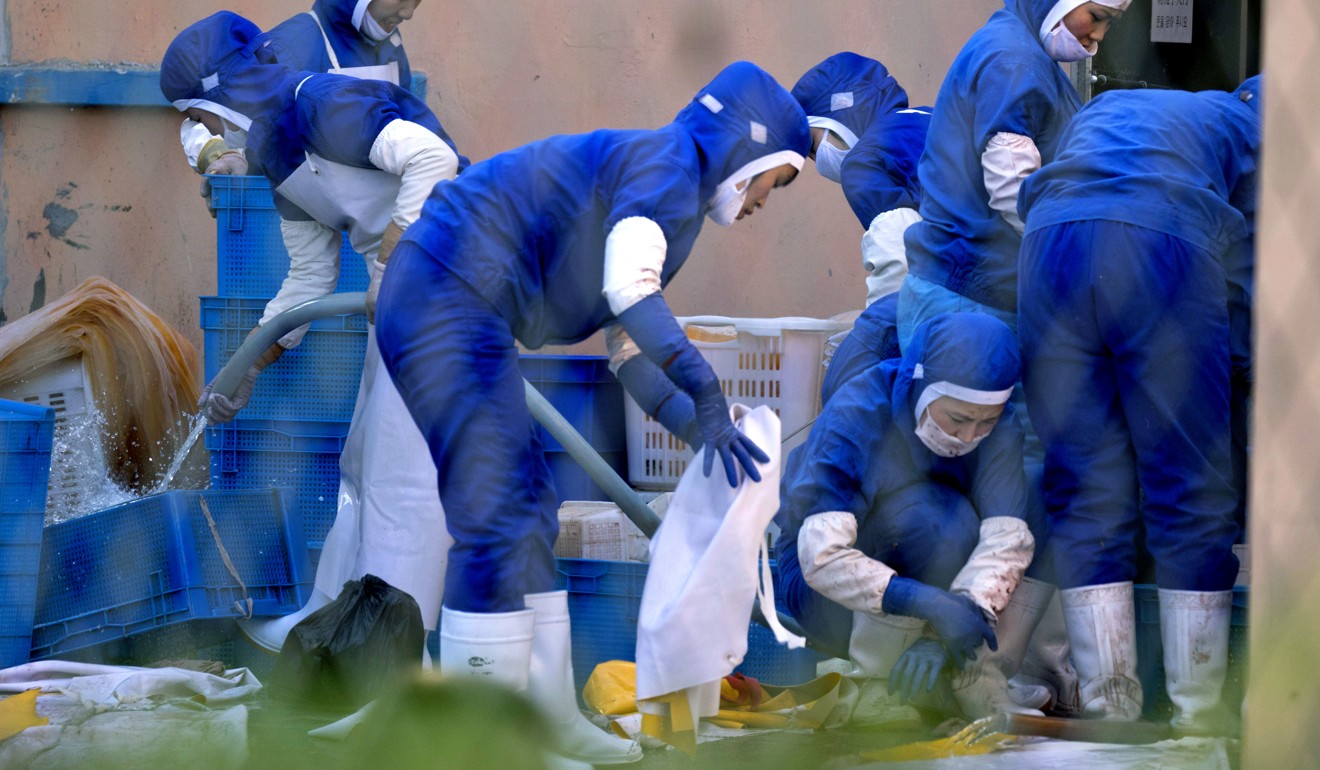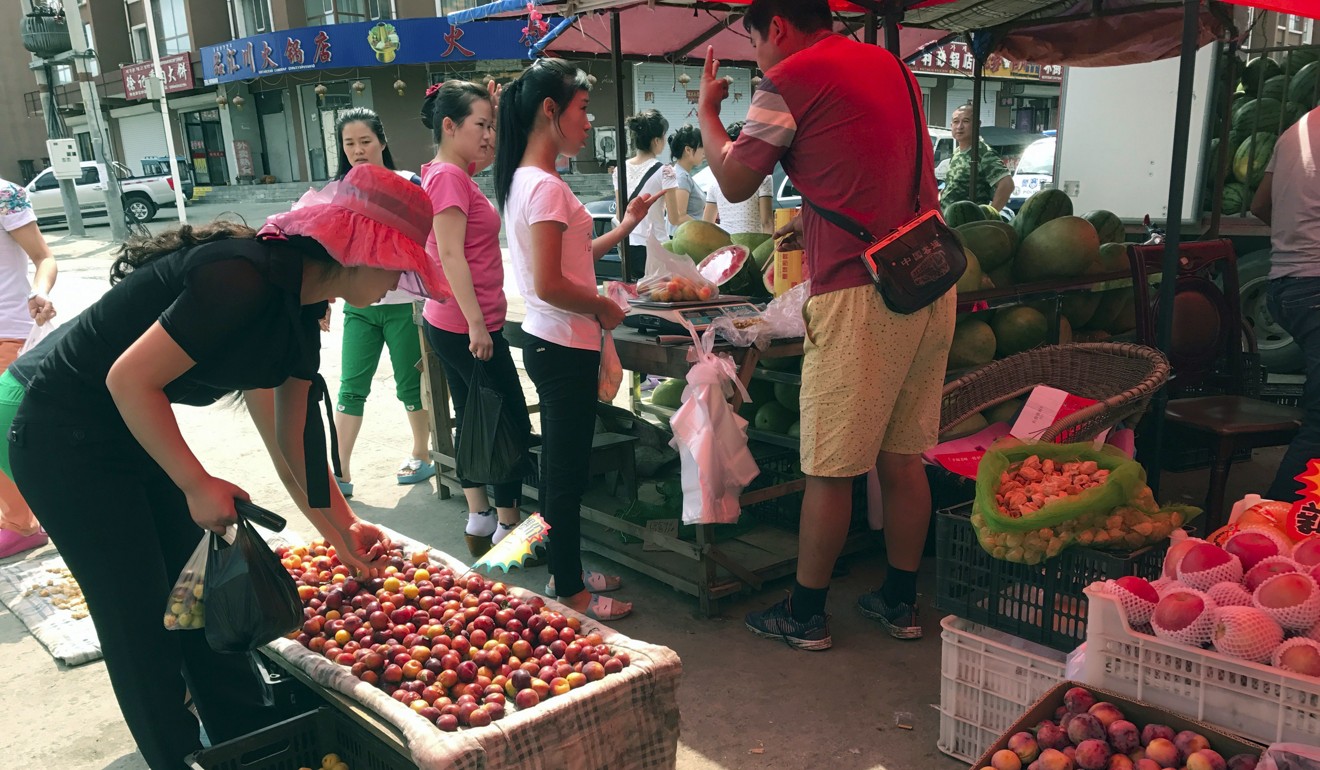
North Korean workers and imports continue to cross border into China despite UN sanctions
- More than 2,000 North Koreans are still being employed in one part of Jilin province, the Post has learned
- Sanctions take their toll on the Chinese side of the border, but some seafood imports are still making their way into local markets
Labourers and seafood products from North Korea can be easily found across the border in a northeast Chinese county that is reeling economically from United Nations sanctions aimed at curbing Pyongyang’s nuclear programme, sources with ties to Chinese companies and North Koreans say.
A UN Security Council resolution approved last year required the return home of all North Koreans working overseas by the end of 2019 to prevent Pyongyang from using the money it took from the workers to fund its growing nuclear weapons programme.
Other sanctions banned imports of North Korean seafood, iron and iron ore in a bid to dry up US$3 billion of annual export income.
But more than 10 sources linked to the Chinese companies and directly tied to North Korea told the South China Morning Post that companies in Hunchun county in Jilin province were still hiring North Koreans. More than 2,000 North Koreans are working in local pharmaceutical and clothing factories, according to other sources.

Seafood from North Korea is also still available locally despite the ban.
“Dozens of coaches, which can seat about 50 people, cross the border [every so often with North Koreans] … It is very well organised,” a Hunchun source said.
Not all of the labourers are entering Hunchun directly from North Korea. A Chinese businessman who travels between Liaoning and Jilin provinces said some had entered from Dandong. The city in southeastern Liaoning province, west of Hunchun, faces the North Korean city of Sinuiju, across the Yalu River.
Brokers and “institutions” that connected North Korean workers to Chinese factories were active throughout Hunchun, the sources said.
North Korea calls on US to ‘immediately lift’ sanctions
Companies throughout the county had welcomed the opportunity to use the workers – many of them controlled by senior North Korean supervisors – to reduce labour costs and increase profit margins, according to a local businessman surnamed Zheng who has had direct contact with North Koreans.
The foreign workers were paid roughly 1,600 to 2,000 yuan (US$230 to US$287) per month, sources said. By contrast, a local Chinese labourer’s pay was about 3,000 to 3,500 yuan.

Zheng backed up reports that the North Koreans’ wages were mostly taken by North Korean supervisors.
“About two-thirds of their salary is taken by the managers,” he said.
A US State Department report in July said Pyongyang takes from 70 to 90 per cent of the labourers’ earnings.
In most cases, employers in the foreign country directly hand the workers’ wages over to the North Korean government, labelled in The North Korea Sanctions & Enforcement Actions Advisory Report as the organiser, manager and overseer of North Korean workers abroad.
Koreas to hold further military talks after disarmament pledge
The clampdown on both North Korean labour and seafood has hurt Hunchun’s economy, local businesspeople said.
With major supermarkets along the border no longer selling North Korean seafood, the number of seafood retailers in the region has dropped. Yet trading in North Korean seafood, predominantly crabs, still can be found in Hunchun’s traditional markets.
Tonnes of North Korean seafood are imported from the port of Rajin, according to retailers and traders in Yanji and Hunchun.
“North Korean crabs are very popular throughout China … We still get orders from Beijing and send the seafood to the capital every day,” one trader at Yanji’s West Market said.
But prices have soared in the border region as a smuggled-in supply fails to meet demand.
As of mid-October, the price of crabs in Yanji’s West Market had surged from about 50 yuan for 500 grams (18 ounces) last year to about 160 yuan this year.
Pyongyang plans to abolish all nuclear weapons, says South Korea
“We normally would have consumed many North Korean crabs as gifts for the Mid-Autumn Festival and National Day, in late September and October … but the price has gone up so much, we can’t afford crabs any more,” said an ethnic Korean small business owner surnamed Jin.
Since the sanctions were imposed, Dalian has replaced North Korea as a major source of local crabs. But crustaceans from the port city in southern Liaoning province remain pricey, recently trading at about 188 yuan for 500 grams at a Yanji supermarket.
A local businessman surnamed Hao said the economic decline brought on by the crackdown on cheap North Korean labour and a “tripling” of seafood prices was transforming the region.
“You could see many businessmen from South Korea and Japan here before the sanctions,” he said. “Now you rarely see them, and as there are no business opportunities, young local people are also leaving the region.”
Illustrating his point, a number of local restaurants and shops are empty throughout Hunchun.
Japan, New Zealand form united front on illicit transfers by N. Korean vessels
Hunchun’s gross domestic product rose 0.2 per cent last year to 14.46 billion yuan, according to official figures.
Meanwhile, the GDP of Jilin, with a population of 27.3 million, accounted for 1.96 per cent of the national total last year, according to the World Economic Outlook database, a compendium of International Monetary Fund economic projections at the global level.
“UN sanctions are not sanctions against North Korea,” Hao said. “It’s a sanction against Hunchun and China’s northeast region.”

